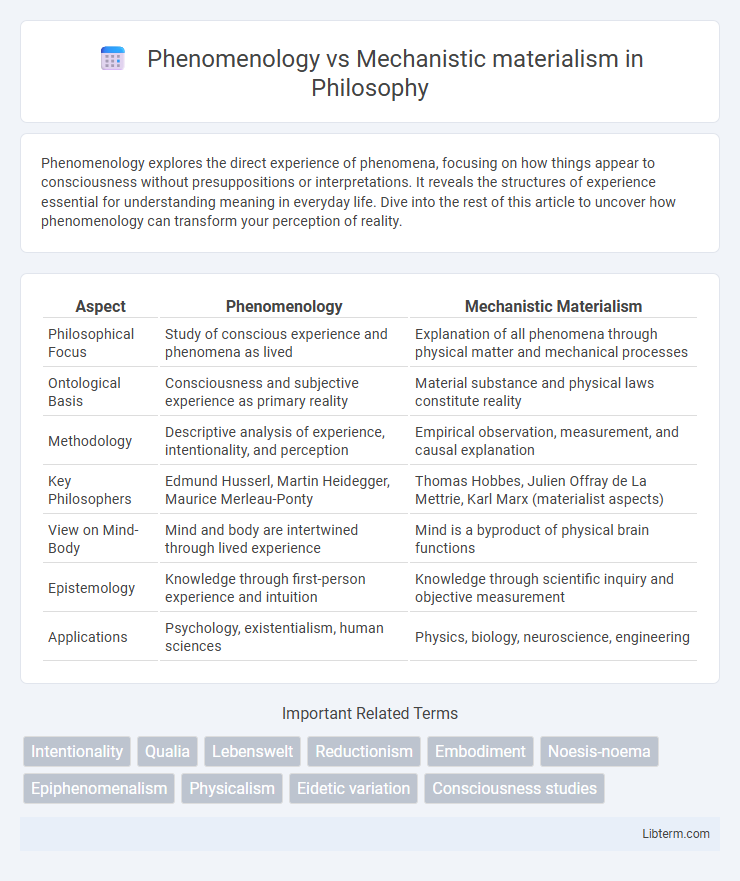Phenomenology explores the direct experience of phenomena, focusing on how things appear to consciousness without presuppositions or interpretations. It reveals the structures of experience essential for understanding meaning in everyday life. Dive into the rest of this article to uncover how phenomenology can transform your perception of reality.
Table of Comparison
| Aspect | Phenomenology | Mechanistic Materialism |
|---|---|---|
| Philosophical Focus | Study of conscious experience and phenomena as lived | Explanation of all phenomena through physical matter and mechanical processes |
| Ontological Basis | Consciousness and subjective experience as primary reality | Material substance and physical laws constitute reality |
| Methodology | Descriptive analysis of experience, intentionality, and perception | Empirical observation, measurement, and causal explanation |
| Key Philosophers | Edmund Husserl, Martin Heidegger, Maurice Merleau-Ponty | Thomas Hobbes, Julien Offray de La Mettrie, Karl Marx (materialist aspects) |
| View on Mind-Body | Mind and body are intertwined through lived experience | Mind is a byproduct of physical brain functions |
| Epistemology | Knowledge through first-person experience and intuition | Knowledge through scientific inquiry and objective measurement |
| Applications | Psychology, existentialism, human sciences | Physics, biology, neuroscience, engineering |
Introduction to Phenomenology and Mechanistic Materialism
Phenomenology explores conscious experience from a first-person perspective, emphasizing intentionality and the structures of perception as foundational to understanding reality. Mechanistic materialism explains phenomena through physical processes and causal mechanisms, reducing mental states and consciousness to material interactions. These contrasting approaches highlight the subjective experience in phenomenology against the objective, measurable basis of mechanistic materialism.
Historical Background of Philosophical Perspectives
Phenomenology, pioneered by Edmund Husserl in the early 20th century, emerged as a response to the limitations of mechanistic materialism, which dominated 19th-century scientific thought with its emphasis on physical causality and reductionism. Mechanistic materialism, rooted in Cartesian dualism and Newtonian physics, explained natural phenomena through tangible, measurable processes, influencing thinkers like Descartes and Laplace. The historical divergence reflects a shift from mechanistic explanations toward a focus on lived experience and consciousness as the foundation for understanding reality.
Core Principles of Phenomenology
Phenomenology centers on the direct experience and consciousness of phenomena, emphasizing intentionality as the fundamental structure of consciousness where every mental act is directed toward an object. It rejects reductionism inherent in mechanistic materialism, which explains reality solely through physical processes and mechanisms, neglecting subjective experience. Core principles of phenomenology include the epoche, or suspension of judgment about the natural world, and the description of phenomena as they appear to consciousness without preconceived theories.
Fundamental Concepts in Mechanistic Materialism
Mechanistic materialism centers on the fundamental concept that all natural phenomena, including mental processes, can be explained through physical matter and mechanistic interactions governed by laws of physics and chemistry. It emphasizes the reduction of complex systems to their simplest physical components and processes, rejecting any non-material explanations. This approach contrasts with phenomenology by focusing strictly on objective, measurable realities rather than subjective conscious experience.
Consciousness: Phenomenological Insights vs Materialist Interpretations
Phenomenology emphasizes first-person experiences and subjective consciousness, highlighting qualities like intentionality and lived experience that materialism often overlooks. Mechanistic materialism interprets consciousness as neural processes and brain activity, reducing subjective awareness to physical interactions and biochemical mechanisms. This contrast underscores the challenge of explaining the qualitative nature of consciousness within a strictly materialistic framework.
Mind-Body Problem: Dual Approaches Compared
Phenomenology explores consciousness as an experiential, first-person phenomenon, emphasizing subjective awareness and intentionality in the mind-body problem. Mechanistic materialism, grounded in physicalism, explains mental states through neurobiological processes and deterministic physical causation, reducing mind to brain function. Comparing both, phenomenology highlights qualitative experience absent in mechanistic explanations, while materialism prioritizes empirical, measurable brain activities underlying cognition and behavior.
Human Experience: Subjectivity vs Objectivity
Phenomenology emphasizes the primacy of human experience by focusing on subjectivity, exploring how individuals perceive and interpret their lived realities. Mechanistic materialism approaches human experience objectively, reducing consciousness to physical processes and treating mind and behavior as products of material interactions. This fundamental divide highlights phenomenology's concern with meaning and intentionality, contrasting with mechanistic materialism's emphasis on empirical observation and causal explanation.
Scientific Implications of Both Philosophies
Phenomenology emphasizes subjective experience and the intentionality of consciousness, challenging mechanistic materialism's reduction of phenomena to purely physical processes. Scientific implications of phenomenology encourage qualitative methodologies and holistic understanding of human cognition, contrasting mechanistic materialism's focus on measurable, deterministic laws governing matter. This divergence influences research paradigms, with phenomenology fostering interpretative science and mechanistic materialism promoting empirical, quantitative investigation.
Critiques and Challenges of Each Perspective
Phenomenology faces critiques for its subjective emphasis on consciousness, which can limit empirical verification and generalizability across scientific contexts. Mechanistic materialism is challenged by its reductionist approach, often neglecting the qualitative and experiential aspects of human consciousness that phenomenology highlights. Both perspectives struggle with integrating objective data and subjective experience, posing ongoing challenges in fields such as philosophy of mind and cognitive science.
Conclusion: Integrating or Diverging Worldviews
Phenomenology emphasizes subjective experience and consciousness as fundamental, whereas mechanistic materialism prioritizes physical processes and objective measurement. Integrating these worldviews requires acknowledging the limits of material explanations in capturing lived experience while incorporating empirical rigor. Divergence persists in their foundational assumptions, but interdisciplinary dialogue fosters a more comprehensive understanding of reality.
Phenomenology Infographic

 libterm.com
libterm.com